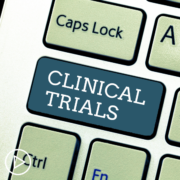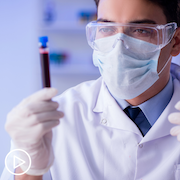What Standard Testing Follows a Myeloma Diagnosis?
What Standard Testing Follows a Myeloma Diagnosis? from Patient Empowerment Network on Vimeo.
What tests will you have following a myeloma diagnosis? Are there additional tests you should request? Dr. Joshua Richter provides an overview of key testing for myeloma and why each test is necessary.
Dr. Joshua Richter is director of Multiple Myeloma at the Blavatnik Family – Chelsea Medical Center at Mount Sinai. He also serves as Assistant Professor of Medicine in The Tisch Cancer Institute, Division of Hematology and Medical Oncology. Learn more about Dr. Richter, here.
Related Programs:

|

Myeloma Treatment: When Should a Clinical Trial Be Considered? |

|
Transcript:
Katherine:
What standard testing follows a myeloma diagnosis?
Dr. Richter:
So, the standard testing that follows a myeloma diagnosis is multifaceted. So, the first one is blood work. And we draw a lot of blood tests to look at the bad protein that the cancer cells make. So, we send tests like a protein electrophoresis which tells us how high that bad protein is. We send immunofixation. That test tells us what type of bad protein it is. You’ll hear names like IgG kappa and IgA lambda.
These are the different types of bad proteins made by myeloma cells. Oftentimes, we’ll send urine tests to find out how much of that bad protein that was in the blood is coming out in the urine. We will, typically, do a bone marrow biopsy. It’s a test where we put a needle into the back of the hip bone to look at the marrow itself. And we’ll use that marrow to figure out how much myeloma there is, any other characteristics like the genetic changes in those cells.
The other big thing is imaging. So, the classic imaging that we do with myeloma is something called a skeletal survey. It’s, basically, a listing of X-rays from head to toe. But nowadays, we have newer techniques, things like whole body low-dose CAT scans, something called a PET-CT scan, and MRI scans. And your care team may have to figure out which one is right for you at what given time.
Katherine:
Mm-hmm. Are there additional tests that patients should ask for?
Dr. Richter:
Absolutely. One of the most important things from myeloma has to do with the genetic risk stratification.
So, for almost all cancers, the staging has a very big impact. And people will often think of cancer in stages I, II, III, and IV, and they’re managed very differently depending upon what stage it is. Myeloma has three stages, stage I, II, and III. But the most important thing is, actually, beyond the staging is what’s called the cytogenetics risk stratification. So, it’s really important when the bone marrow is sent to be sure that it is sent for, kind of, advanced techniques. Because you really want that snapshot of exactly what the genetic profile is, because that gives us information of A) how to treat, and B) prognostic, you know, who will tend to do better or worse based on this information. And even though that may not tell us which drugs to use, specifically, it may say, should we do something like a transplant or not? Should we consider a clinical trial early or not?
Katherine:
I see. How do test results affect treatment choices?
Dr. Richter:
So, test results can affect treatment choices in a number of ways. Probably, the most common one is thinking about the routine blood tests like your CBC or complete blood count and your chemistry, which looks at things like your kidney function. Some drugs tend to have more toxicity to the blood counts. So, if your blood counts are very low, we may choose drugs that don’t lower the blood counts very much.
Kidney function which we, usually, measure by something called the creatinine. Creatinine is made by the muscles and cleared out by the kidneys. So, if your kidneys aren’t working very well, you don’t pee out creatinine, and that creatinine level will rise in the blood. If your creatinine level is high, we may choose certain drugs that don’t affect the kidneys or not metabolized or broken down by the kidneys.
The genetic studies that we use – we’re not quite at this base yet where we can say, if you have this genetic abnormality in your myeloma, we should use this drug except there’s some really great data on the cutting edge about a drug called venetoclax.
Venetoclax is a pill that’s used to treat other diseases like lymphoma and leukemia. And it turns out that people who have what’s called a translocation (11:14) which means part of the 11th chromosome and part of the 14th chromosome in the cancer cells swap material.
Those people respond amazingly well to venetoclax. So, we’re starting to have what we would call precision medicine where we find your genetic abnormalities, not that you got from your parents or passed to your kids, but the genetics inside the tumor cells to tell us which treatments will work best for you.






